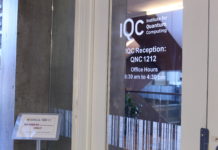One of the perks of being university senators is the occasional opportunity to read performance reports on the various departments, programs, and plans on the Waterloo campus — we lead exciting lives. October’s senate meeting heard a discussion regarding the undergraduate option in society, technology, and values (STV), currently offered by the Faculty of Engineering. Haven’t heard of it before? That’s not surprising. While STV classes are popular electives within engineering, an average of one student enrolls in the program each year.
STV deals with how developing technologies impact society. It considers disciplines from software engineering to ethics, sociology, and environmental science. It’s a growing field of research that Waterloo seems especially poised to become a leader in. To this end, the STV reviewers recommend formalizing a Centre for Society, Technology, and Values. This was one of a few recommendations in the report which suggested better integrating the program with other departments on campus. However, the recommendations and action items in the report do not always align.
First, the report expresses disappointment in the low enrolment by non-engineering students, yet it suggests continuing to offer STV courses in the evening, so that primarily engineering students can attend. Second, it suggests improving relationships with other parts of campus, but also insists on the need to remain insular and work on current strengths. Third, the reviewers specifically note the importance of forging stronger ties with the Faculty of Arts, but the report also says that there is no evident reason why this relationship should be pursued (ironically, this is followed by a concern about why there are so few arts students in STV courses).
Given all these contradictions, it seems that the report avoids asking the obvious question: where is the best place to host STV, if the goal is to develop a world-class teaching centre? In my opinion, it is not in engineering.
As evidenced by perennial accolades from national and international rankings, our Faculty of Engineering is among the best in the world. Yet as far as teaching is concerned, the course offerings are largely limited to those required for accreditation, plus some restricted electives. Because of this, non-engineering students would seldom think of looking to engineering for elective courses or program options. There are, without a doubt, other reasons for STV’s limited growth, but the point is that if STV has not been able to attract sufficient attention in the many years it has been hosted by engineering, it’s hard to imagine that its fortune will change drastically while still within it.
However, as always, suggestions of change are met with resistance. The level of autonomy given to our faculties makes them allergic to most “top-down” initiatives. As is the case with STV, the preference is to develop from within rather than looking at the possibilities from a university-wide perspective.
Such tensions may even increase under the new university budget model. The model provides transparency in how funds are allocated when students take courses out-of-faculty, but it does so by tying faculty budgets directly to enrolment in their courses. In other words, there is incentive to have as many students as possible take courses in your faculty. This will obviously intensify the ownership that faculties claim over the courses they offer.
In conclusion, this discussion is not about the Faculty of Engineering, or where STV is best located (though, for the sake of discussion, the departments of philosophy and knowledge integration have been tossed around as ideas.)
It is more importantly about program development and academic vision on campus. When an opportunity like this arises — to capitalize on the great potential of a strong but undervalued program — the whole university community should rally around it and work for its success. Unfortunately, the independence given to each of Waterloo’s faculties creates a sense of protectionism that can be an impediment to implementing innovative initiatives at a university-wide level. This is not the first time we have seen concerns of “local ownership” stifle discussion about “global vision” at UW, and we suspect it will not be the last.
Andrew and Sacha are the at-large undergraduate members of the university aenate. Send them your thoughts at andrew.clubine@uwaterloo.ca or sforstner@uwaterloo.ca.































